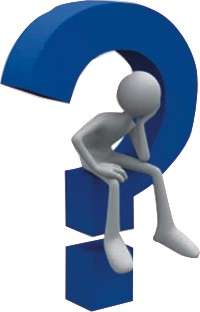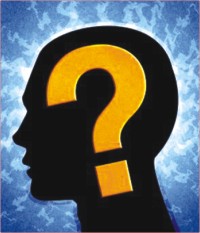 Last and Least Last and Least
What
Dr Binoy Barman
WHAT' is the most fundamental question in human life -- for the Homo sapiens that can think and talk. In practice, it peeps into human mind virtually in every situation and in every time. The bulk of human communication centres on 'what', which is used to extract information necessary for the questioner and supposed to be in the repertoire of knowledge of the question receiver. Without the question of 'what', the pursuance of knowledge will be limping and human mind will remain barren. Therefore 'what' is an epistemological blessing.
The impulse of 'what' is universal so every human language must have the linguistic symbol relating to the question. In Bangla we express the interrogation as 'ki', in Spanish 'qué', in French 'quoi' and in Italian 'cosa'. Notice the 'k' sound that is shared by these languages, which is indicative of their common origin. Historians claim that all these languages belong to the Indo-European Family, descending from the mother Proto Indo-European. Etymologically, English 'what' has been derived from the Middle English form 'hwat', which was 'hwæt' in Old English; It holds an affinity with the Latin form 'qui' which is a descendent of Indo-European interrogative base ''kwo' or 'kwe', meaning 'who' or 'what'. Inquisition to know some phenomena with 'what' or so is a cognitive imperative, which is expressed by different words in different languages. No language can dispense with it.
As a single word in English, 'what' is complete in itself as a question. When I hurl the word at anybody, he/she knows what I ask for and he/she will help me providing necessary information if he/she is in a position to do so. Besides seeking information, 'what' may also be used to express surprise. If I say 'what?' with a rising or fall-rise tone, it will mean I cannot just believe what you say. For example: 'Do you know Jyoti Basu is dead?' 'What?' It simply functions as an interjection, so better may end with an exclamation mark. One more example: 'What! Earthquake in Dhaka?' It may also be used to ask for repetition of something. For example: 'I say he is an idiot.' 'What?' Relevant here would be a note of verbal decency. If you have missed what somebody has just said and you want him/her to repeat, it would be impolite to say 'what?' In that situation 'sorry' or 'pardon' would be a better option.
In English grammar, 'what' is the interrogative pronoun, which is used in information-seeking question. It appears at the beginning of the sentence and is followed by a verb. For example: 'What is the meaning of life?' It may be used as subject or object of the sentence. For example: What happened? What do you want? In the first sentence 'what' is subject while in the second it is object. When we call 'what' an object we mean 'semantic object'. Structurally, 'what' is still the subject. Structure counts position (the initial noun phrase position in this case), not the meaning. Semantically, 'you' is the actual subject which has taken 'what' as its direct object. According to the question formation rule in English, the interrogative pronoun must be transposed to the beginning of the sentence. So the transformation is from 'You want what' to 'What do you want', whereby 'do' has been added as an operator. In the theory of modern transformational syntax, this structural phenomenon is called 'Wh-Fronting'.
When 'what' is used as a subject, it may be both singular and plural. The number will be indicated by the form of verb that follows. If the verb is singular in the present indefinite tense, it will take an 's' or 'es' with it.
 And if the verb is plural in the present indefinite tense, it will not take any 's' or 'es'. That means the presence or absence of 's' or 'es' determines singularity or plurality of 'what'. In the singular case, 'what' will refer to a particular thing, and in the plural case, it will mean multiple things. Therefore if somebody says, 'What falls apart?' it should be interpreted as 'What thing falls apart?' or 'What is the thing that falls apart?' On the other side, if somebody says, 'What fall apart?' it should be interpreted as 'What things fall apart?' or 'What are the things that fall apart?' Both of them are valid. And if the verb is plural in the present indefinite tense, it will not take any 's' or 'es'. That means the presence or absence of 's' or 'es' determines singularity or plurality of 'what'. In the singular case, 'what' will refer to a particular thing, and in the plural case, it will mean multiple things. Therefore if somebody says, 'What falls apart?' it should be interpreted as 'What thing falls apart?' or 'What is the thing that falls apart?' On the other side, if somebody says, 'What fall apart?' it should be interpreted as 'What things fall apart?' or 'What are the things that fall apart?' Both of them are valid.
When we use 'what' as subject or object, it is essentially a noun. In English grammar, 'what' has many other uses. It can be used as an adjective. For example: 'What time will the leader address the rally?' 'What role does he/she play in the parliament?' Here 'what' functions as the modifier of the noun 'time'/'role'. As modifier (or determiner), 'what' may be used to emphasize reaction; for example, 'What fantastic news!' When used this way, it is an adverb, more precisely, an intensifier. The modifier and noun together form a noun phrase (NP). 'What' may be used in sentence as adverb in another way: 'What does it matter?' Here 'what' modifies the verb 'matter'. Mind its difference with 'What is the matter?' where 'what' is a pronoun.
'What' may introduce a clause. For example: 'What the politicians say is wrong.' In this sentence the subordinate clause 'What the politicians say' is introduced by 'what'. It is a clause functioning as subject. It may also function as object and complement. For example: 'I do not believe what the politicians say' (object); 'You are not what you pretend to be' (complement). In this usage, the meaning of 'what' is 'that which' or 'the thing or things which'. One should be able to distinguish 'what' from 'which' when used as clause introducer. 'Which' is a relative pronoun, so it introduces a relative clause. For example: 'I do not believe a word which the politicians say. Note that 'which' is always preceded by an antecedent ('word' in the above example) to which it refers while it is not the case with 'what'. What is self-contained; it needs no antecedent.
'What' may also be used as noun, in the meaning of 'true or basic quality of something'. For example: 'We have to uncover the what of this mystery'. 'What' has also contributed to some useful compounds in English, such as: 'whatever' (anything or everything), 'whatsoever' (anything that may) and 'whatnot' (other similar things). Examples are: Whatever happens, I must go there. She does not like me, whatsoever. She has beauty, money and intelligence, and whatnot?
Now we look at some interesting idioms formed with 'what'. What about your failure in exam? ('what about' means 'what is the opinion concerning something) You are favouring him. What for? ('what for' means 'for what purpose?' or 'why?') What if he rejects it? ('what if' means 'what would happen if') In a few days he will know what's what. ('what's what' means 'true state of affairs'). Is he a good man or what? ('or what' means 'what do you think') They are not supporting me, so what? ('so what' means 'who cares'). He is an actor; what's more, he is a singer. ('what's more' means 'in addition). I see here all the new arrivals; what's on? ('what's on' means 'what is coming') Why are you talking in such a way; what's up? ('what's up' means 'what is the problem') What the hell are you doing? ('what the hell' indicates disapproval)
You should not also miss some superb proverbs in English with 'what'. If you do something very secretly, you just say: Left hand doesn't know what the right hand is doing. If you want others to follow what they utter, you advise them: Practice what you preach. Everything is the result of what people did in past, so you remind them: Reap what you have sown. Or you may blame the luck, with an old saying: What is lotted cannot be blotted. So you realise now what an interesting subject 'what' is! 'What' is so engrossing, so encompassing. No human talker can ever do without it.
(The writer is Assistant Professor and Head, Department of English, Daffodil International University.)
|
